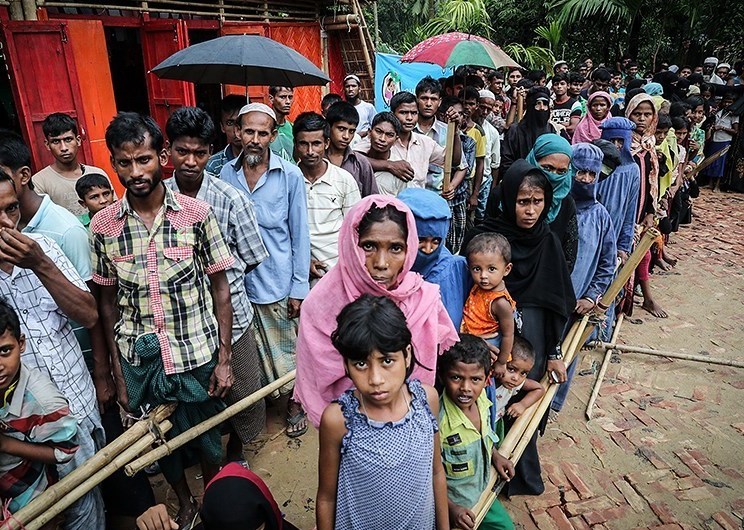The Plight of the Rohingya
Is the UN to blame?
I remember my skin crawling with fear when I entered the Holocaust Museum in Skokie, Illinois for the first time. It became a feeling that I never want to feel again, but it was a life-changing experience. At the Museum, I also learned a jaw-dropping statistic: since the Holocaust, there have been genocides in Rwanda, Cambodia, Uganda, Bosnia, Darfur, Bangladesh. Today, ethnic cleansing occurs in Myanmar, a small, former British colony in south Asia. The government has violently uprooted the minority Rohingya population in the Rohingya state, causing many to flee into neighboring Bangladesh to escape the violence. The United Nations has proposed resolutions to punish Myanmar for war atrocities against the Rohingya; however, some countries are unwilling to go along with the act due to economic ties, fearing negative economic implications. The United Nations must look beyond these factors to end this genocide.
The situation in Myanmar concerning the Rohingya people betrays the promise made by the United Nations to end genocide, even after countless failures to prevent genocides have shown that a problem clearly exists. Max Bearak, a correspondent for the Washington Post, reports on the “renewed violence” against the Rohingya, saying that around “250,000 Rohingya” or more flee Myanmar over two week periods.
Bearak also reports that the treatment of the Rohingya has received the ire of “influential figures from Malala Yousafzai to Desmond Tutu to John McCain,” all whom have called for the genocide to end. When such “influential figures” realize the war crimes committed by the Burmese, why do world leaders at the UN have trouble punishing the Burmese government?
The over 250,000 Rohingya who have fled Myanmar in a two-week period show the true nature of the genocide. The United Nations must look beyond economic alliances with countries that commit war crimes and follow through on their promise to eliminate genocide from the face of the Earth.
World leaders at the UN turn a blind eye to certain issues to benefit themselves. One of these concerning issues has been international genocide. Elizabeth Dias and Feliz Solomon, correspondents for Time Magazine, show the horrific plight of the Rohingya, telling stories of death and pain at their homes being taken from them. Dias and Solomon highlight how the prime minister of Myanmar, Aung San Suu Kyi, “declines to criticize the military….[and] instead questions the international outcry [to the violence].” Countries at the United Nations would agree with Suu Kyi, citing that the international community was rushing judgement in calling the violence a genocide declining to trust the fact of the scenario. Beneath that support lies the truth. Countries supporting Myanmar value their economic ties with the country, and for that reason, do not want any resolutions to pass that would hamper Myanmar economically, as their economy would therefore suffer as a trade partner. However, looking at the economic implications of an issue leads to countries ignoring humanitarian issues.
Although this issue can no longer be ignored, many would argue that this does not deserve the attention it receives, as the trade in today’s world has become valuable in a globalized economy. This belief has festered not only in the economic alliance between Myanmar and China, but also within the alliance between Russia and Syria. In a Reuters article, correspondent Michelle Nichols discusses how Russia has sunk plenty of resolutions to punish Syria for war crimes due to trade relations with the country (Nichols). Russia, one of the major countries on the UN Security Council, uses its veto power for self-interest rather than for the greater good of eliminating genocide on Earth. A very similar situation occurs regarding Myanmar; China uses its veto power to support their interest rather than recognizing the issue at-large. The Chinese and the other major powers in the UN would support this; they argue that in order for the globalized community to be in order, strong trade partnerships must be upheld.
However, their argument that the ends justify the means by ignoring this genocide does not hold ground. According to the UN’s website, actions representative of genocide include “killing members of the group, causing serious bodily or mental harm to members of the group, [and] deliberately inflicting on the group conditions of life….to bring about….physical destruction,” all of which are present in the situation concerning the Rohingya. The United Nations came to clear consensus after witnessing the cost of human life due to the Holocaust. What the Nazis did shocked them. What the Myanmar government has done to the Rohingya should have equally shocked them. However, with the ever-changing globalized economy, the United Nations has faced gridlock. Countries fear the negative implications of giving up trade, such as the important trade partnership between Myanmar and China. This not only betrays the Rohingya, this betrays the core values the UN stands for. If the UN desires to uphold its values and fulfill a promise, economics should be second-tier to the violence committed against an entire group of people.
The genocide occurring in Myanmar has sadly become less of an issue than the UN avoiding the issue altogether. The United Nations must look past economic implications of certain actions and do what ethically and morally solves certain issues, the most serious: international genocide. If the countries in the United Nations cannot do this, the Myanmar government will succeed in their quest to quench the Rohingya. Unfortunately, the UN will catch itself repeating its “Never Again” promise, this time, knowing that they are responsible for the massacre of an innocent group of people.




